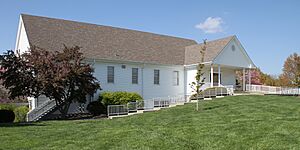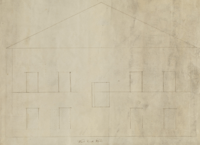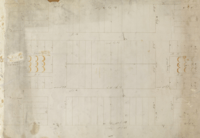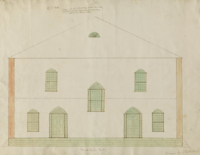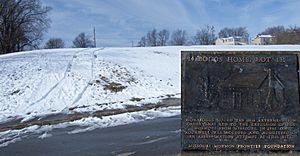Temple Lot facts for kids
Quick facts for kids Temple Lot |
|
|---|---|
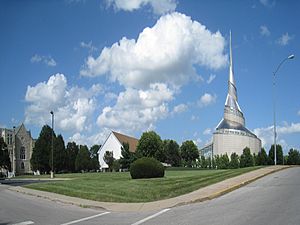
The Temple Lot in Independence, Missouri, with Church of Christ (Temple Lot) headquarters in white frame building just to the left of center; Community of Christ temple and Stone Church to the right and far left, respectively.
|
|
| Religion | |
| Affiliation | Church of Christ (Temple Lot) |
| Year consecrated | 1831 |
| Location | |
| Location | 200 South River Boulevard, Independence, Missouri |
| Architecture | |
| Groundbreaking | 1831 (cornerstones laid by Joseph Smith) |
| Completed | Never completed |
| Site area | 63.27 acres (25.60 ha) |
The Temple Lot is a special piece of land in Independence, Missouri. It is very important in the history of the Latter Day Saint movement. This was the first place chosen for building a temple.
The land, about 67 acres in total, was bought on December 19, 1831. Edward Partridge bought it to be the center of the "City of Zion". This was after Joseph Smith said he received a special message, called a revelation. This message said the site would be where Latter Day Saints would gather in the future. Smith dedicated the area on August 3, 1831. Today, two different Latter Day Saint groups own most of the property: the Church of Christ (Temple Lot) and the Community of Christ.
The smaller part of the Temple Lot, about 2.5 acres, is an open, grassy field. It has a few trees and the main building of the Church of Christ (Temple Lot). This group does not consider their building a temple. The larger part, about 63.5 acres, is mostly owned by the Community of Christ. Many important buildings are on or near this land. These include the United Nations Peace Plaza, the Community of Christ Auditorium, and the Community of Christ Temple.
Contents
The Temple Lot Story
The city of Independence, Missouri, became very important to the Latter Day Saint movement in 1830. This was just a few months after the religion officially started. Joseph Smith, the founder, said he received messages that called Independence the "Center Place" of "Zion." Many early followers believed that the Garden of Eden had been located there.
Some people, like Alexander Majors, who lived in Independence in 1831, wrote about these beliefs. He mentioned that Mormon elders said the Temple Lot was "the center of the earth." They also said it was where the Garden of Eden was located. They believed the "New Jerusalem" would be built there, and that Jesus Christ would return to live in this city.
Joseph Smith never officially said that Independence was the Garden of Eden. So, most Latter Day Saints do not formally accept this idea as a teaching. Smith later said that a place called Adam-ondi-Ahman, about 50 miles north of Independence, was where Adam and Eve went after leaving the Garden. But he never confirmed or denied if Independence was Eden itself.
Even though Smith chose the Temple Lot for his new City of Zion, the Latter Day Saints had to leave Jackson County in 1833. They also left Missouri in 1839. This happened before a temple could be built. Later, who owned the property became a big legal issue. This was especially true between the Church of Christ (Temple Lot) and the Reorganized Church of Jesus Christ of Latter Day Saints (RLDS Church). These groups formed after Joseph Smith's passing.
In 1891, the RLDS Church, led by Smith's son Joseph Smith III, went to court to get the property. They won in the first court, but then lost in a higher court. The United States Supreme Court did not review the case.
Today, the small Church of Christ (Temple Lot) owns the Temple Lot. They got the land in 1867. In 1929, they tried to build their own temple on the property. This was the only attempt to build a temple there since Joseph Smith's time. But they were not successful. This church has its main building on the site. This building has been damaged by fires twice.
Since about 1976, the Church of Christ (Temple Lot) has said it will not work with other groups to build a temple. They also say they will not sell the land, no matter the price. Some members of other Latter Day Saint groups have called them "squatters." But the Church of Christ (Temple Lot) strongly believes it has the right to be the "custodian" of the property.
The Community of Christ (formerly the RLDS Church) is the second-largest church in the modern Latter Day Saint movement. It owns most of the original 63-acre property around the Temple Lot. This larger area is often called the greater Temple Lot. This land was bought in the 1830s by Latter Day Saint bishop Edward Partridge. It was meant to be the main common and sacred area. The Community of Christ has its world headquarters here. Its Auditorium opened in 1958, and its Independence Temple was dedicated in 1994.
The the Church of Jesus Christ of Latter-day Saints (LDS Church) has a visitors' center near the Temple Lot. They also have other buildings on their part of the greater Temple Lot.
Early History of the Site
Choosing the Location
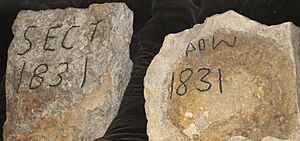
In March 1831, Joseph Smith said he received a message that a "New Jerusalem" would be built in the United States. In June 1831, he said another message told him the New Jerusalem would be on the western border of Missouri. It was to be "on the borders by the Lamanites [Native Americans]." Independence is about six miles (10 km) east of the Missouri–Kansas border. This border was the line where Native American tribes were to be moved.
On July 20, 1831, Smith shared another message with more details. It said: "The land of Missouri ... is the land which I have appointed and consecrated for the gathering of the saints: wherefore this is the land of promise, and the place for the city of Zion. ... Behold the place which is now called Independence is the center place, and the a spot for the temple is lying westward upon a lot which is not far from the court house: wherefore it is wisdom that the land should be purchased by the saints; and also every tract lying westward, even unto the line [the Missouri-Kansas border] running directly between Jew [Native Americans] and Gentile. And also every tract bordering by the prairies, inasmuch as my disciples are enabled to buy lands. Behold this is wisdom, that they may obtain it for an everlasting inheritance."
Smith's idea to buy all the land between Independence and the Kansas border made many non-Latter Day Saint settlers in Jackson County upset.
On August 3, 1831, Smith and others placed a stone. This stone was meant to be the northeast cornerstone of the future temple. On December 19, 1831, Edward Partidge bought 63 acres, including the Temple Lot. During this purchase, Smith said: "The temple shall be reared in this generation, for verily this generation shall not pass away until an house shalt be built unto the Lord and a cloud shall rest upon it." Since no temple has been built there, Smith's prediction has caused discussion.
Temple Building Plans
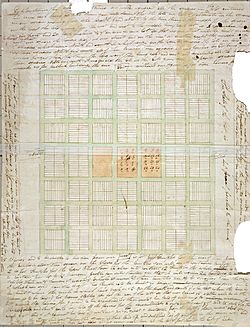
In June 1833, Smith created the Plat of Zion. This plan showed how the community would be set up. At the center of the city, there would be 24 "temples." Twelve were for the high priesthood and 12 for the lesser priesthood. The temple planned for the Temple Lot was called "The House of the Lord for the Presidency." It was designed to be 87 feet long and 61 feet wide. It would have two stories, each 14 feet high. The foundation was to be made of stone, and the walls of brick. The plans included many windows, doors, and even a belfry with a large bell.
Leaving Jackson County
In July 1833, a Mormon newspaper published a Missouri law about free blacks coming to Missouri. This made many non-Mormon neighbors in Jackson County very angry, especially slave owners. They burned the newspaper building and attacked Bishop Edward Partridge and Elder Charles Allen. This led to the Latter Day Saints being forced to leave Independence and Jackson County later that year.
The Latter Day Saints moved to Clay County, Missouri. They tried to get their land back in Jackson County. They later moved again to Caldwell County, Missouri. But they were eventually forced out of Missouri completely in the 1838 Mormon War. In March 1839, Joseph Smith told his followers to sell all their land in Jackson County and other parts of Missouri. The Temple Lot was sold to Martin Harris, but the sale was not officially recorded.
After Joseph Smith
Attack on Lilburn Boggs
Lilburn Boggs was the Governor of Missouri during the Mormon War. He lived in Independence. Many Latter Day Saints blamed him for their troubles. After he left office, Boggs lived near the Temple Lot. On May 6, 1842, he was shot in the head by someone unknown. Boggs was badly hurt but survived. Some suspected Mormons, and Porter Rockwell was arrested, but no one was found guilty.
The Hedrickites Acquire the Land
Joseph Smith passed away in Carthage, Illinois, in June 1844. On April 6, 1845, Brigham Young wanted to get the Temple Lot back for the church. But he and most Latter Day Saints were moving to the Salt Lake Valley. They were unsure how people in Jackson County would react if they returned. In 1848, they decided to accept a $300 offer to give up their claim to the land.
In 1847, Independence became an official city. The Temple Lot was given legal numbers. While most Latter Day Saints went with Brigham Young, other groups in Illinois wanted to return to Independence to build the temple. The first group to move back was the small Church of Christ (Temple Lot), also called "Hedrickites." They had their first meeting in Independence on March 3, 1867. This was the first time Latter Day Saints had gathered in Independence since 1833. They could not afford the entire greater Temple Lot. But they managed to buy the Temple Lot itself. They built their first meetinghouse there in 1882.
On June 9, 1887, the RLDS Church claimed the entire 63-acre greater Temple Lot. They bought the land from the family of Oliver Cowdery. The only part they argued over was the Temple Lot itself. In 1891, the RLDS Church sued the Church of Christ (Temple Lot) for the land. They won in the first court but lost when the case was appealed to a higher federal court.
Attempts to Build a Temple
On February 4, 1927, Otto Fetting, an apostle of the Church of Christ (Temple Lot), said that John the Baptist had visited him. Fetting claimed John the Baptist appeared as an angel and told him to build a temple on the Temple Lot. The church leaders and most members agreed. They started digging on April 6, 1929. The temple was supposed to be 180 feet long and 90 feet wide.
After marking out the ground, an angel supposedly appeared again. The angel said the building was "ten feet too far east." It told them to move the markers. When they dug, they found the original stones Joseph Smith had buried. These stones matched the survey markers. Today, these two original stones are in the Temple Lot headquarters building. Their original spots are marked by other engraved stones on the lot. The outer corners of the planned temple are also marked by similar stones.
Later that year, a disagreement about baptism happened within the Church of Christ (Temple Lot). Fetting left the church, and many members followed him. They started new churches, like the Church of Christ (Fettingite). The Church of Christ (Temple Lot) asked for money to build its temple. But they did not get much, and construction never went beyond digging the foundation. This hole was filled in by the city of Independence in 1946. The church had given up on the project. The area was then made into a grassy field. No new plans for building a temple there have been announced.
Fires at the Meetinghouse
The first meetinghouse on the Temple Lot was the home of Edward Partridge. It was used as a school, a Sunday meeting place, and a conference center. It was burned down on November 5, 1833. About 200 other Latter Day Saint homes were also burned that day.
In July 1898, a man named William David Creighton Pattyson was arrested. He was trying to remove a fence around the Temple Lot. He reportedly demanded that church officials give him ownership of the property. Early on September 5, 1898, he set fire to the small headquarters building. He then turned himself in to the police. He was later sent to a mental institution.
On January 1, 1990, another man, described as a former member, set fire to the Temple Lot meetinghouse. This building was built in 1905 to replace an earlier one that was also damaged by fire. The 1990 fire damaged the upper floor. The rest of the building was torn down, and a new one was built. This new building is now the church headquarters, conference site, museum, and local meeting place.
Museum
A small museum is run by the Church of Christ (Temple Lot). It is located on the lower floor of their headquarters building. It has some of the original stones that Joseph Smith placed to mark the corners of his planned temple. The museum also sells church books and other materials.
See also
 In Spanish: Lote del Templo para niños
In Spanish: Lote del Templo para niños


